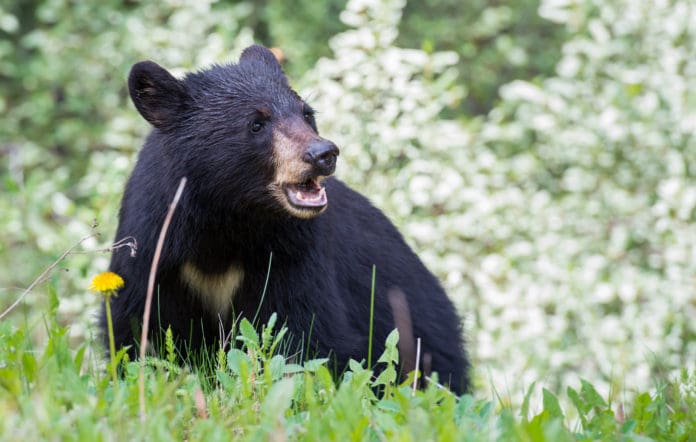Missouri hunters wrapped up their first ever black bear hunting season, a sign of successful conservation and wildlife management.
The Missouri Department of Conservation (MDC) approved the inaugural 10-day black bear hunting season and all early signs point to the tags getting quickly filled. The black bear population is healthy and the hunting season only lasts 10 days, ending Oct. 28.
Following the Science
Black bears were almost non-existent in the 1800s in Missouri but their numbers have continually crept up, with bears migrating from Arkansas. There are now an estimated 800-1,000 bears in Missouri. The bears are mostly located in the southern half of the state. They’ve grown their numbers by nearly 10 percent each year, according to the MDC. The new hunting season made sense.
“So our bear population has been growing steadily over many, many decades,” said Laura Conlee, a Missouri furbearer and black bear biologist. “We have good survival and high reproduction.”
Interested bear hunters watched the population growth and noted the MDC announcement.
“Being able to add this iconic species to the long list of hunting opportunities for Missourians is a testament to the decades of bear research and management by MDC staff,” MDC Director Sara Parker Pauley said. “A limited annual hunting season will help manage the growing number of black bears in the state.”
Science Leads to Success
It didn’t take long for Missouri’s hunters to see the success. The MDC held a tag drawing and hunters jumped at the chance. Four hundred permits were drawn at random for hunters to have the chance to head out and harvest a Missouri black bear. Once 40 bears are taken and reported the season is done. The state was split up into three bear management zones with daily reporting.
According to the St. Louis-Dispatch, a hunter in southwestern Missouri earned the honor of taking the first state-sanctioned black bear, a 250-pound female that was hunted on private land. A second black bear was reportedly taken on public land a day later.
The first hunter kept it simple in relaying his feelings after his successful shot. He posted on his Facebook page, “This was probably the most thrilling, exciting thing that I’ve ever done.”
As of this reporting, seven bears had been taken.
Success Leads to Healthy Wildlife
Successful wildlife management opportunities like the new black bear hunt in Missouri is a longtime priority for hunters and recreational shooters. It means more opportunities to pass along family hunting traditions to the next generations of hunters, but also more funding to the state for conservation projects that benefit all outdoor seekers. The cycle continues over and over.
When black bear tags are purchased in Missouri, or any other hunting licenses, that money supports conservation. That’s in addition to the Pittman-Robertson excise tax paid by firearm and ammunition manufacturers that’s also funding conservation efforts in Missouri and elsewhere.
Since the Pittman-Robertson excise tax was enacted and the firearm and ammunition manufacturers began paying into the fund in 1937, contributions have surpassed $14.1 billion dollars. That’s a point of pride for the firearm and ammunition industry and the hunters supporting the industry when they purchase their products. It means wildlife populations from the bald eagle to the Missouri black bear have all thrived while hunting has served as the most effective wildlife management tool.
Hunting has also seen a boost during the coronavirus pandemic. Hunters have gone out in record numbers and more Americans from all walks of life are finding time to get into the woods, fields and marshes. Hunting is America’s greatest pastime with a renewed interest.
Missouri black bear hunters fortunate enough to have their name drawn know just how special is the opportunity. The black bear hunt program by the MDC is a 10-year management plan and will be revisited in 2030. Missouri’s bear population is connected to a larger bear population in the surrounding states of Arkansas and Oklahoma, both of which have established bear-hunting seasons.
The first black bear season will be the start of a what is expected to be new hunting traditions in Missouri. Hunting has proven to be an effective management tool and invests hunters in ensuring that healthy and sustainable wildlife populations perpetuate for future generations. This year’s hunt is a reason to celebrate the hard work of conservation and the bright future for outdoorsmen and women.
Larry Keane is SVP for Government and Public Affairs, Assistant Secretary and General Counsel of the National Shooting Sports Foundation.





If black bears are not native to that state, then they are an invasive species. So is a closed season warranted ? Seems the same as a season on wild hogs. What does everyone think ?
Black bears are native to North America and pretty much go where they damn well please. So… to me that says that they are not an invasive species even though their Missouri population was very low in the past.
On the other hand, the biggest invasive mammal in America is the kitty cat. Maybe we should have an open season on those!
Well fed domesticated cats kill for the fun of it. Sometimes they just capture and torture their victims.
Yes, black bears are native to all North America. As for domesticated cats, they are very destructive to all kinds of native critters, and (ahem) are on the list of quietly hunted species in some areas. The authorities don’t regulate them (license and leash laws) to the same extent that dogs are regulated. My brother lives a couple doors down from a neighborhood cat lady. Quite annoying. It’s a public perception thing–cats seldom bother the neighbor’s kid or the mail carrier, but they regularly kill songbirds and small mammals. A neighbor’s cat recently left a freshly killed shrew on our doorstep, likely as a token of thanks to my wife for feeding birds, thus providing a consistent supply of prey for him and his clowder.
Bears are native to all of North America. So were grizzly bears and “mountain” lions…. I hope to see the return of grizz and cat to the whole country, and soon.
800 bears & they slaughter 40? Did one steal a pic-a-nic basket? Kinda harsh. We need an open season on bambi in ILLinois. Giant rats…
former water walker, Bears can be very destructive and dangerous to humans. But you already know that. Suggestion, if Ill does not have an open season on deer, you might try filing a Freedom of Information request as to why the State does not have a hunting season for deer? This might get you information that can fuel your case. Publicity of this kind can be very potent.
“The first hunter kept it simple in relaying his feelings after his successful shot. He posted on his Facebook page, “This was probably the most thrilling, exciting thing that I’ve ever done.””
He posted that on F-book?
I hope he has cameras outside to catch the Leftist Scum that try to burn his house and car…
Remove the shackles on hunting feral hogs. *Those* nasty things are invasive, destructive, and prolific. No tags, no reporting, no government oversight. Want those things kept in check and reduced in numbers? Let the locals take care of the problem…licketysplit.
That’s the way it is in Florida.
No season, no bag limit, not even a Florida hunting license required to pop the piggies.
A real popular hunting combo down here is an AR-platform .300 BLK with subsonic ammo and a can.
(And it just so happens that the Hyperion can in the pipeline is for my .300 BLK AR…)
My .300 BLK AR is my favorite, and happens to be my SHTF go-to. Although, here in CA the evil suppressor is forbidden, so I use 120g supersonic loads. Very loud…so loud, in fact, that when I took the ‘ol girl out to the nearby open desert for her inaugural run with my buddies and popped off the first few rounds, they all turned to me and said, “what is THAT?”
There are very few jurisdictions that have any significant regulation of feral hog hunting. The biggest shackle in most places is ready access to them. Private landowners on the one hand clamor for relief from feral hog problems, but on the other hand may charge hundreds of dollars to allow a hunter to shoot one. And shooting just one has an infinitesimally small effect on the overall population. The second biggest consideration (not really a shackle, per se) is hunter interest, which has been growing recently but still lags far behind interest in other critters such as deer.
Hawkeye,
Well said and incredibly accurate information. Kudos to you sir or ma’am.
Keep in mind that commenter I Haz a Question lives in California–a state that is notorious for licensing and/or taxing pretty much everything.
Yep… I learned about the truly destructive aspects of the feral hogs while visiting the farm of a bro-in-law in southern Missouri Ozarkia. Incredible, and in no danger of being wiped out or “slaughtered”. A truly invasive and destructive species, like the Asian carp and snakeheads.
In WI we have a annual black bear harvest of right around 4000. The harvest on whitetail deer is 160,000 to 200,000 a year out of a 2,000,000 deer population with 600,000 licensed conservationist hunting. Very few (a couple thousand) feral hogs in the state. No limit, season, or hunting hours on coyotes. Wide open there
With this increase in popularity, there are concerns about how much longer the Missouri bear population will sustain itself before it dwindles down due to overhunting. There are also concerns about whether or not there will be enough cookie clicker bears to meet the demand for permits next year because it takes 3 years for black bears
vonrueden Pure unadulterated HORSE PUCKY! According to count of Missouri bears, they number around 800 according to the State of Missouri. I doubt that the hunting season will deplete the bear population much. Missouri issued 400 permits for the hunting season, randomly selected from 6,000 applicants who paid $10 apiece. This year’s hunt is scheduled for 10 days, but the state set a quota of 40 bears. If the hunters report hitting that limit before Oct. 28, the hunt would stop.
Seems you are one of those PETA folks? Do you eat meat?
Whoever wrote that “vonrueden” response included a “cookie clicker” to get unsuspecting people to give their computer info by clicking on to (his) website. Clearly a violation of common decency if not the rules of this website. TTAG moderators (if such exist) should remove that post and block the poster’s computer address from posting on this site again.
Comments are closed.